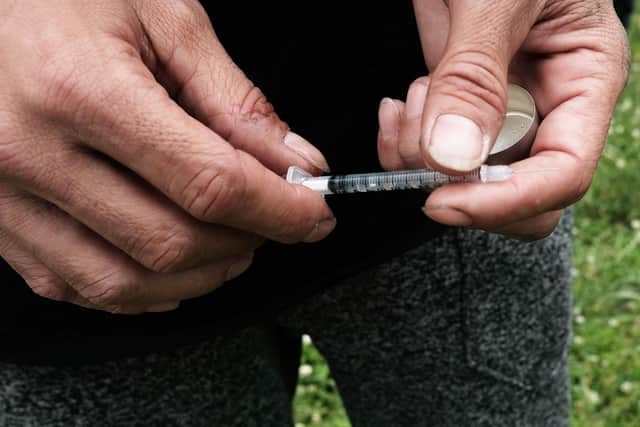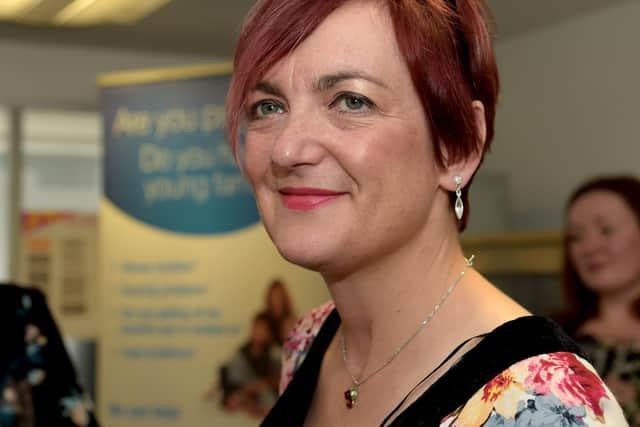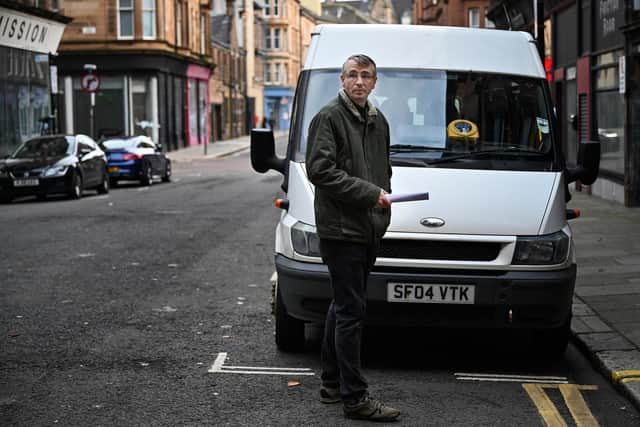Confidence in Scottish Government delivering on reducing drug deaths dwindles due to lack of action, says campaigner
Peter Krykant, Cranstoun project lead, said recommendations in the newly published Scottish Drug Death Taskforce report could have been implemented "years ago” as he stressed the voices of people going through drug addiction must be at the centre of policy design and delivery.
His comments come as the taskforce published its final report after three years of work examining how to deal with Scotland’s drug death crisis.


Advertisement
Hide AdAdvertisement
Hide AdAimed at tackling the nation’s drug-related deaths, which is the highest rate in Europe, the report states the approach to drugs should move away from punishment towards care.
The taskforce’s chairman, former chief constable David Strang, said the report was a “message of hope”, adding: “Addiction is not a crime. You can’t punish people out of addiction.”
The report makes 20 recommendations and calls for 139 specific actions to be taken by the Scottish and UK governments, as well as other organisations.
Changes in the law are recommended, including legislation at a UK level for safe drug consumption rooms to go ahead.


Work on the first consumption rooms should begin soon, Mr Strang said, calling for an action plan from the Scottish Government within six months.
The drugs death taskforce was set up in 2019 after Scotland recorded more than 1,000 drug-related deaths a year for the first time. In 2020, 1,339 died from a drug overdose.
The report recommends fully implementing new Medical Assisted Treatment (MAT) standards - relating to opioid replacement drugs like methadone – across Scotland within two years, developing an extensive naloxone network and creating better outreach after non-fatal overdoses.
Mr Krykant, who examined supervised injections of heroin and cocaine via a consumption van he set up in Glasgow, said: “It’s been years in the coming, this report, and it’s regurgitating what’s been recommended before and those recommendations have not been implemented.”


Advertisement
Hide AdAdvertisement
Hide AdIn a statement on drug policy in January 2021, Nicola Sturgeon said there would be wider roll-out of heroin-assisted treatment throughout the country that would be introduced within the financial year. However, Mr Krykant said this had just not happened.
He said: “Eighteen months down the line, we still only have the same amount of heroin-assisted treatment and there’s not been any roll-out except in Glasgow to a handful of people and that’s unacceptable.
“What we need to do is get people with living experiences, not ‘lived’, at the centre of how services are designed and delivered. That voice is never heard in Scotland.”
Mr Krykant said the main driver of Scotland’s drug associated deaths was the lack of people in treatment for problematic drug use.
“We’ve got an estimated 40 per cent of people in treatment at the moment who are problematic drug users,” he said. “That’s just too low. In England and Wales, it’s estimated to be over 60 per cent of people in treatment. We should be aiming to get that up to 70 to 80 per cent within the next year.”
The taskforce report criticises the Scottish Government drug and alcohol service funding as "woefully inadequate" in relation to demand as it represents just 0.8 per cent of the health and sport budget.
Mr Strang called the Government's deadline to meet new treatment standards this year "unrealistic” as he said this should be pushed back to 2024.
Mr Krykant said increases in people in treatment could have been made had Scotland rolled out further heroin-assisted treatment.
Advertisement
Hide AdAdvertisement
Hide AdHe said: “It’s all taken far too long. I don’t see any reductions in drug deaths until the words are turned into action. The actions are there and they are on the table.
“I heard the taskforce chairman saying it could be five years of similar drug deaths statistics, but it simply doesn’t need to be like that.”
Asked if he had any confidence of the Government delivering on improving lives for those impacted by drug addiction, Mr Krykant said: “If you asked me 18 months ago I would have said ‘yes’, especially when you hear the Scottish Government get up and talk about areas in need of improvement and change.
“The hopes were high, but these things have not been achieved.”.
Mr Krykant added: “When it comes to an independence referendum, they can have the proposals on the Lord Advocate’s table and pushed up to the Supreme Court within days. With the overdose and prevention, they sat on their hands for years and blamed the UK Government for it.”
Scottish Conservative leader Douglas Ross criticised the SNP's plans for another independence referendum, which he said used time and resources that should be spent on lives lost to drugs, which he described as Scotland’s “national shame”.
He said his party's Right to Recovery Bill would be a “game changer” in the fight against drug deaths and suggested drugs policy minister Angela Constance could back it to go through Parliament now.
Ms Constance said the report delivered a “bold blueprint of what needs to be done” to save and improve lives.
Advertisement
Hide AdAdvertisement
Hide AdShe said: “Progress around the MAT standards wasn't good enough and fast enough, so that’s why for the first time ever we have used a ministerial direction under legislation to ensure that every integrated joint board, every health board and every local authority at a very senior level sign off improvement plans."
Safe consumption rooms will be considered by the Crown Office after the Scottish Government submitted a proposition built with partners in Glasgow.
Ms Constance said: “It will be for the Crown Office and, ultimately, the Lord Advocate to say whether safe drug consumption facilities can be delivered within the existing legal framework of Scotland.
"I am committed to safer drug consumption facilities. The evidence across the world shows that safer drug consumption facilities work. They are not a silver bullet, but they are opportunity to save lives.”
Comments
Want to join the conversation? Please or to comment on this article.
